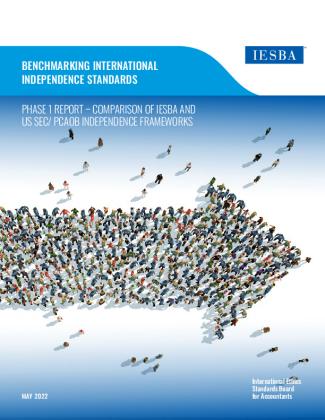
The staff of the International Ethics Standards Board for Accountants’ (IESBA) has completed a study comparing the provisions of International Code of Ethics for Professional Accountants (including International Independence Standards) (the Code)—in particular the independence provisions applicable to audits of financial statements of public interest entities (PIEs)—with the relevant rules of the U.S. Securities and Exchange Commission (SEC) and the US Public Company Accounting Oversight Board (PCAOB).
The study focuses primarily on the SEC rules and includes a reference to the PCAOB's independence requirements only where those requirements are incremental.
The Report reflects the IESBA Staff's understanding of the respective frameworks being compared, and incorporates input received from the IESBA's Benchmarking Working Group.
For more information, contact Szilvia Sramko
The IESBA staff is grateful to all those that have engaged with us in the development on the Benchmarking initiative, especially members of the Benchmarking Working Group, Ms. Laura Friedrich (Chair), Mr. Richard Fleck (NAS Task Force Chair), Mr. Richard Huesken (IESBA Member), Mr. Peter Oastler, (Independence Expert), and Ms. Kristen Wydell (IESBA Technical Advisor).
-
Who is the Benchmarking Report For?
The Report is intended for readers who seek to obtain a deeper understanding of how the Code compares to the analogous SEC/PCAOB independence rules. Stakeholders, including regulators, national standard-setters and professional accountancy organizations, firms, academics and accounting educators, and others are encouraged to review the Report to obtain insights into the similarities and the differences between the Code's independence requirements that globally applicable versus the US-based SEC/PCAOB rules.
Those charged with governance, policymakers, and others not directly involved in the application and implementation of independence standards might find it convenient to review the Summary Report.
-
Why Undertake This Benchmarking Study?
The IESBA launched the benchmarking study to promote awareness and adoption of the Code, especially the recently issued changes to the International Independence Standards (IIS) (e.g., the Non-Assurance Services (NAS) and fee-related provisions). The outcome of the benchmarking is intended to provide insights into how the provisions in the Code compare with those of a major jurisdiction like the U.S. and will ultimately instill greater public confidence in the robustness of the Code.
Image
IESBA's Work to Strengthen International Independence Standards
Learn more about the recent changes made to the Code in the areas on non-assurance services, fees, and the definitions of Listed Entity and Public Interest Entity
-
What’s Covered Under the Benchmarking Initiative?
Informed by the input of the IESBA’s Benchmarking Working Group, the IESBA’s Consultative Advisory Group and the members of the IESBA, the staff-prepared Report addresses the focus areas and topics of greatest interest to the IESBA, users of the Code, and other stakeholders.
Without making judgments as to the relative merits of the two independence frameworks (such as whether one framework is more stringent or rigorous than the other), the report highlights the similarities and key differences between the Code and the U.S. SEC and PCAOB rules in areas of greatest interest to stakeholders. Among others, focus areas include permissibility of NAS to audit clients, fees, auditors’ communication with those charged with governance about independence matters (including pre-approval of NAS and disclosure about fees), long association with an audit client, and business relationships.
The benchmarking study focused on whether the Code’s provisions address the same topics/ issues set out in the SEC/PCAOB rules and whether the two independence frameworks achieve comparable outcomes. The resulting Report highlights the differences between the two independence frameworks, with special regard given to those that might result in practice in different outcomes regarding the prohibition or permissibility of services or relationships to an audit client.
-
What Did We Learn?
The Code and the SEC/PCAOB rules are intended to apply in different circumstances. Whereas the Code is intended to apply to over 130 jurisdictions around the world, the SEC/PCAOB rules reflect U.S. law. This results in different approaches in terms of applicability and use. Notwithstanding the difference in the approach, neither the Code nor the SEC framework is entirely "rules-based" nor entirely "principles-based."
- Both independence frameworks specify overarching principles that are supported with specific requirements for firms/ auditors.
- The two independence frameworks set out similar fundamental objectives (or principles) by which an auditor's independence is assessed. For example, in the case of the Code, firms are required to apply the conceptual framework to independence, while compliance with the SEC's general independence standard is required under the SEC rules.
- There are differences in the terminology of the two independence frameworks (e.g., related entities versus affiliates).
- The practical application of overarching principles under the Code and SEC rules might result in differences.
The IESBA Staff determined that the Code and the SEC/PCAOB frameworks address similar key issues under the observed focus areas in a comparably similar manner. The differences between the frameworks mainly result from the different circumstances in which the frameworks operate and the global applicability of the Code.

